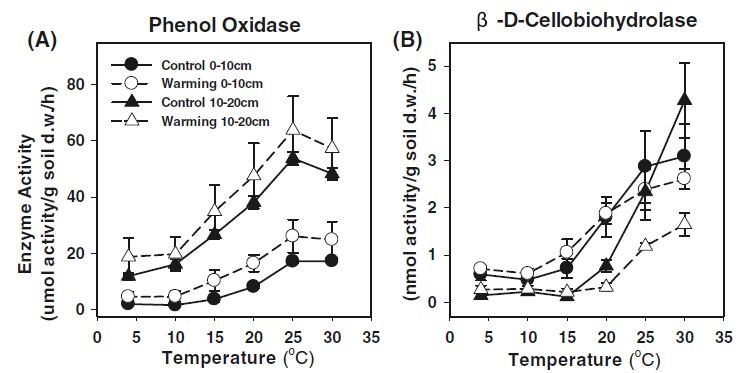Alpine grassland soils store large amounts of soil organic carbon (SOC) and are susceptible to rising air temperature. Soil extracellular enzymes catalyze the rate-limiting step in SOC decomposition and their catalysis, production and degradation rates are regulated by temperature. Therefore, the responses of these enzymes to warming could have a profound impact on carbon cycling in the alpine grassland ecosystems.
This study was conducted to measure the responses of soil extracellular enzyme activity and temperature sensitivity (Q10) to experimental warming in samples from an alpine grassland ecosystem on the Tibetan Plateau. A free air-temperature enhancement system was set up in May 2006. Researchers measured soil microbial biomass, nutrient availability and the activity of five extracellular enzymes in 2009 and 2010. The Q10 of each enzyme was calculated using a simple first-order exponential equation. They found that warming had no significant effects on soil microbial biomassC, the labile C or N content, or nutrient availability. Significant differences in the activity of most extracellular enzymes among sampling dates were found, with typically higher enzyme activity during the warm period of the year. The effects of warming on the activity of the five extracellular enzymes at 20 oC were not significant. Enzyme activity in vitro strongly increased with temperature up to 27oC or over 30 oC. Seasonal variations in the Q10 were found, but the effects of warming on Q10 were not significant.
Researchers conclude that soil extracellular enzymes adapted to seasonal temperature variations, but did not acclimate to the field experimental warming.

Fig. Temperature dependence of enzyme activity at 4, 10, 15, 20, 25 and 30 oC.
A Rates of POX activity in August 2010. B Rates of CB activity in May 2010
Additional Information:
Author Information: Xin Jing , Yonghui Wang , Haegeun Chung , Zhaorong Mi , Shiping Wang , Hui Zeng, Jin-Sheng He
Correspondence: jshe@nwipb.cas.cn
